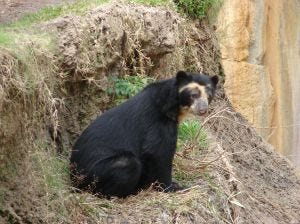
The number of bear-related calls received by the Florida Fish and Wildlife Conservation Commission (FWC) are on the rise in northwest Florida.
In 2002, the FWC logged just 118 calls for the 16-county area stretching from Escambia County over to Jefferson County. In 2012, that number rocketed to almost 1,700 calls.
Bears are driven by the urge to eat and it doesn’t matter to them whether it’s garbage or other easy sources of food such as birdseed or pet food. The key to keeping bears in the wild and out of your yard is denying them easy access to food.
In Wakulla County, which has experienced a rapid human growth and rise in bear complaints in the past several years, two things have transpired to reduce human-bear conflicts.
For one thing, garbage pick-up is now mandatory for all residents. Problems with garbage sitting for days in cans in outlying areas and becoming a target for hungry bears have been mostly resolved. Secondly, Waste Pro, the waste service company in the county, is now making modified and bear-resistant cans available to residents experiencing bear problems. Residents can receive a modified trash can for $6 extra per year, or a bear-resistant can for $6 per month. Even with the extra fee, many residents are keeping their garbage secure in the wildlife-resistant cans.
In nearby Franklin County, the developers of St. James Bay, a planned residential development that will eventually total almost 500 homes, require the use of bear-resistant cans.
To the west, there’s no better example of a proactive approach in reducing bear issues than on U.S. Air Force Base’s Hurlburt Field in Okaloosa County. Several years ago, Hurlburt Field officials required the use of bear-resistant garbage cans and dumpsters of all base personnel, and implemented an education program on the do’s and don’ts when living near bears. They were able to document more than a 70 percent decline in calls and complaints about bears.
Elsewhere in Okaloosa County, communities and governmental leaders are working with the FWC to reduce human-bear conflicts. For example, the city of Fort Walton Beach has retrofitted old plastic-lid dumpsters with reinforced lids to keep bears from raiding them for food scraps. The city is also installing inexpensive gate-hasp hardware on existing garbage cans to keep bears from household garbage.
The nearby city of Mary Esther, and Valparaiso, are similarly retrofitting garbage cans used by city residents.
While there are other notable successes in dealing with bears, the key to drastically reducing the number of problems in the future is cooperation between county governmental leaders and waste service companies to make reasonable options available for residents to keep their garbage secure. Providing bear-resistant garbage cans to the public and a willingness by the public to use those cans are the most important components needed to reduce human-bear conflicts.
This article originally appeared on Santa Rosa Press Gazette: Denying bears easy access to food is the key
